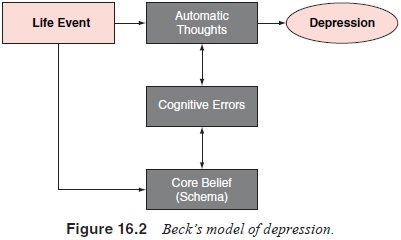Chapter: Essentials of Psychiatry: Cognitive Psychology: Basic Theory and Clinical Implications
Major Depressive Disorder (MDD)
Major Depressive Disorder (MDD)
It has been consistently observed that individuals
suffering from major depression are prone to a negativistic bias in cognitive
pro-cessing. Within Beck’s influential cognitive model of depression (Figure
16.2) (Beck, 1976; Beck et al.,
1979), these depressotypic negative thoughts are held to be centrally involved
in the onset and maintenance of the depressive episode (Figure 16.2). In
addi-tion, Beck’s model proposes that many depressive thoughts occur
automatically, in the absence of attentional awareness. In a man-ner similar to
that observed with anxiety disorders, it appears that the attention of
depressed patients is selectively focused on environmental cues congruent with
the depressed state (Engel

and DeRubeis, 1993), such as cues related to themes
of failure or rejection.
Rehm (1974) has identified another prominent
dysregula-tion of the attentional system in MDD in the self-control model of
depression, in which it is noted that depressed patients often devote excessive
attentional focus to ruminative appraisal of self. By extension,
self-management therapy for depression (Rehm, 1984) assists patients in
shifting attentional focus away from self, thereby freeing up mental processing
resources for the formula-tion of more effective behavioral responses.
Related Topics